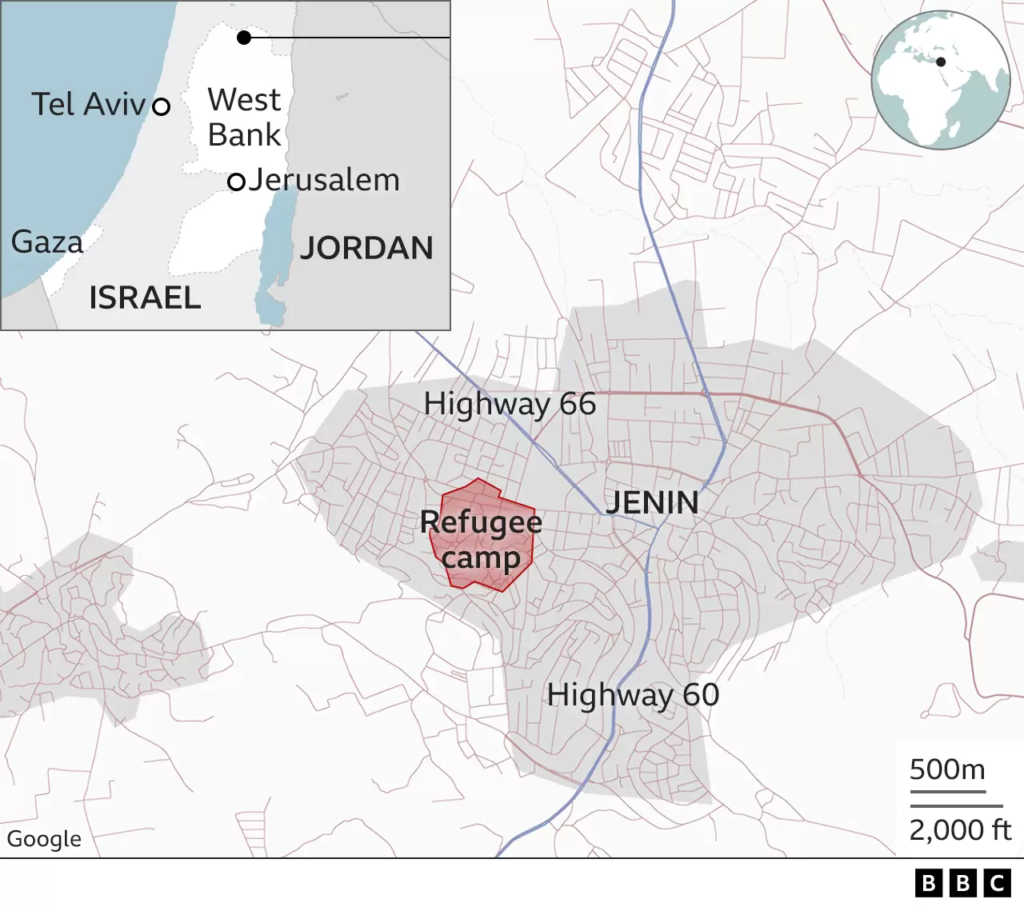Mahmoud Abbas, the president of Palestine, has traveled to Jenin in the occupied West Bank for the first time in almost ten years.
It happens one week after a significant Israeli military attack on the city’s refugee camp.
The Palestinian Authority (PA) leader made the trip in an effort to restore his authority in the midst of the greatest political and security crisis to hit the region in 20 years.
He promised to restore the camp, which he referred to as “an icon of struggle”.
Mr. Abbas came amid chaos at the camp gates, where flags of the internationally recognized PA flew alongside those of the Palestinian extremist group Islamic Jihad.
He had taken a military chopper from his headquarters in the city of Ramallah, located 100 kilometers (62 miles) to the south, to Jenin.
Large-scale armed forces were deployed. To make room for the 87-year-old to enter the camp, sections of which are still devastated from Israel’s air and ground attack, PA security forces teamed up with a 1,000-strong squad of Mr. Abbas’ special presidential guard.

The Palestinian president spoke of defiance, calling Jenin camp “heroic” and claiming that it “stood against the aggression and sacrificed its people for the homeland” while using a stuttering microphone that frequently failed to function and made it difficult for the audience to hear.
He also urged cooperation. We came to proclaim that we are a single authority, state, law, security, and stability.
Fewer than a hundred of the 24,000 occupants of the urban refugee camp, a further indication of the decline in popular support for the PA, were present.
The Oslo peace accords of the 1990s saw the establishment of the PA, which granted the Palestinians some degree of self-governance before the transition to an independent state was anticipated.
Many Palestinians now see it as a security subcontractor for Israel’s 57-year-old military occupation of the West Bank. According to polls, the majority of Palestinians now support armed resistance because they feel the PA is failing to protect them.
Mohammed al-Ghoul, a resident of Jenin, was in the audience when Mr. Abbas, widely known by the nickname Abu Mazen, gave his address. He pleaded for cooperation between all the Palestinian factions but lamented the reality that the PA forces retreat when Israeli forces arrive.
According to him, “Abu Mazen has brought the [Palestinian] military with him, including snipers and troops.”
“The Israelis wouldn’t dare to enter if they were here like this during an occupation [Israeli] army raid.”
Israel’s military raids in the West Bank have increased, and Mr. Abbas has threatened to stop security coordination with Israel—a promise he has made numerous times but seldom follows through on.

As Mr. Abbas talked, armed militants patrolled further within the camp, but his forces stayed still.
According to BBC reports from Palestinian sources, the terrorist organizations coordinated the president’s visit with PA security personnel. They said that on Tuesday, the militants gave the PA troops permission to destroy upgraded explosive devices (IEDS) that had been buried beneath roadways in an effort to stave off Israeli military raids.
An important aspect leading up to the Israeli action last week was the recent use of such IEDS against Israeli troops.
The sources claim that the PA released about a dozen Palestinian militants from its prisons in return for the coordination.
Mr. Abbas also made a quick trip to an adjacent cemetery to place a wreath at the graves of nine of the 12 Palestinians who died last week. Militant organizations have claimed ten of the deceased as members. Additionally, one Israeli soldier perished.
The Jenin Brigade, a group of militants, are mostly in charge of the camp. It is a loose coalition of armed organizations, including Hamas and Islamic Jihad, two more seasoned organizations. They are all classified as terrorist organizations by the West and Israel.
Israel has increased its fatal military raids in the West Bank as the number of Palestinian armed attacks against Israelis has increased over the previous year. Since January, more than 30 Israelis and at least 160 Palestinians have died.
The two-day military operation last week, according to the Israeli government, aimed to prevent Jenin camp from becoming a “refuge for terrorism.” In addition to “advanced” improvised explosive devices, it claimed to have captured hundreds of firearms and other weaponry.
It was Israel’s largest attack on the West Bank in 20 years, with drone attacks and armored excavators wreaking havoc.
The Palestinian leadership referred to it as a “war crime,” while the United Nations charged Israel with employing disproportionate force.









